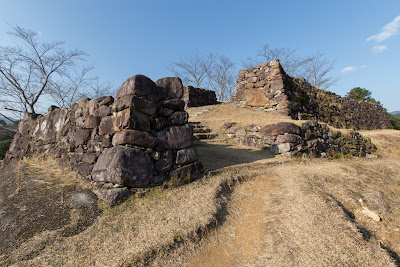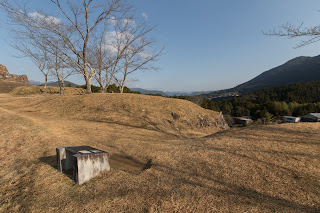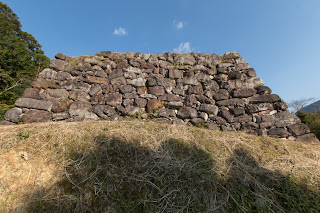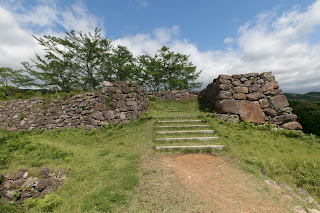Akagi Castle
-Toyotomi period castle remains in deep mountain-
Overview
Name: Akagi castle (Akagi-jo)
Alias:
Place: Akagi Kiwa-cho Kumano city, Mie
Location: 33.89576614330346, 135.95059564182412
Type: Hill Castle
Built: 1586
Remaining remnants: Stone walls and clay walls
Title:
Akagi castle (赤木城) is located in Akagi area at the western part of Kumano city. Akagi area is a small basin in deep inland of Kii mountain, at the middle of the route connects Kitayama village and Ise route of Kumano-Kaido road, which was the pilgrim road to Kumano Hongu shrine from Ise province via Kumano city. Near the castle there is "Maruyama Senmaida", which is the layer of over one thousand terraces of rice field spread over the steep slope.
Kumano area is located at southeast shore of Kii peninsula. Being surrounded by steep mountains, this area had been isolated from political center of Kii country (Wakayama prefecture) and Ise country (Mie prefecture), and was a kind of extraterritorial area. In medieval era, people at seashore of this area activated as naval force called as "Kumano Suigun", utilizing good ports at ria coast and abundant wood produced in backside mountain. On the other hand, in mountain side there were small local lords and mountain priests, and lived by agriculture and forestry.
In March 1585, central ruler Hideyoshi Toyotomi (1537-1598) started his campaign against Kii country, mainly for Saika party and monk solider of Negoro temple. By the end of march Toyotomi army captured current Wakayama city area, and further advanced to southwest area of Kii peninsula such as Arita city. Yukawa clan which was the largest clan of this area fiercely resisted to Toyotomi army, but after the half year battle Yukawa clan surrendered.
At the same time, Toyotomi army came into Kumano area. Horiuchi clan, the leader of naval force at Shingu castle, had already connection with central government through trade and mercenary, thus subordinated to Hideyoshi and kept their territory. On the other hand, lords of mountainous area also belonged to Hideyoshi, and Kii country was finally held by Toyotomi government. Hideyoshi left Kii country to his trustable younger brother Hidenaga Toyotomi (1540-1591), along with Yamato country (Nara prefecture).
But local people who hated the strict ruling of central government and repeatedly revolted to Toyotomi government. In 1586, large revolt by local warriors called as "Kitayama Ikki" occurred, and thousands of people occupied the area. In response to this, to show the authority of Toyotomi government and keep the production of woods as strategic resource, Hidenaga made thorough oppression to this rebellion by 1589 and executed the leaders.
After the suppression of rebellion, Hidenaga placed his most trustable general Takatora Todo (1556-1630) as a magistrate of this area. Takatora had to manage non obedient local people of this area with small soldiers, especially at his absence due to participation of military actions of Hidenaga. To keep the castle long period with small soldiers, Takatora built a small but secure castle with latest technology and named it as Akagi castle.
Akagi castle was built at a small hill of 50 meter height from the hillside. Central area is a 40 meter long square at the top of the hill, and a complex gate was built at the southeast edge, Two ridges spread from hilltop to southeast ward and southwest ward, then terraces were built along these two ridges. Edge of these terraces were guarded by stone walls, and paths from hillside were exposed the attack from upper terrace.
At the valley surrounded by these two ridges there are large terraces, might be used as a residence of commander. Backside of central area is protected by 3 meter tall stone walls, one of the highest one of this castle. Stone walls of this castle are not so high but used effectively, and structure of main entrance of central area seems powerful and functional. Even though small castle of 200 meter long and 100 meter wide, this castle matches to the name of Takatora Todo who was later known as master of castle building and built many famous castles such as Uwajima castle, Imabari castle or Tsu castle.
Takatora reigned this area about 10 years from this castle, but in 1595 Takatora was appointed as a commander of Uwajima castle (Ehime prefecture) and left this castle. Akagi castle might be abolished at this time or soon later that, as this castle kept the original style of old style Toyotomi castles.
In 1600, after the battle of Sekigahara, Asano clan was appointed as the governor of Kii country, and placed tighter controls for local retainers. In 1614, local lords of Kitayama area made revolt again against Asano clan when Asano army left the company to participate in the battle of Osaka castle in 1614, but rebellion army was thoroughly suppressed by returned Asano army, and this place became stabilized.
The ruin of Akagi castle was certainly destructed in early Edo era, but recently the site was prospected, and stone walls of the castle was restored based on the result of excavation. Akagi castle is quite valuable as a rare and complete example of small Toyotomi period castle, and basic element of Toyotomi castles such as blocking by stone wall and approach by folding path is clearly seen. Although it locates at far distant area and is difficult to approach, but it is recommended to visit along with Shingu castle if possible.
150 minutes drive from Nagoya city via Ise Jidoshado Expressway and Kisei Jidoshado Expressway.
Shingu Gastle -Castle with river port at traditional town-
Type: Hill Castle
Built: 1586
Remaining remnants: Stone walls and clay walls
Title:
Brief History
Akagi castle (赤木城) is located in Akagi area at the western part of Kumano city. Akagi area is a small basin in deep inland of Kii mountain, at the middle of the route connects Kitayama village and Ise route of Kumano-Kaido road, which was the pilgrim road to Kumano Hongu shrine from Ise province via Kumano city. Near the castle there is "Maruyama Senmaida", which is the layer of over one thousand terraces of rice field spread over the steep slope.
History of Kumano area
Kumano area is located at southeast shore of Kii peninsula. Being surrounded by steep mountains, this area had been isolated from political center of Kii country (Wakayama prefecture) and Ise country (Mie prefecture), and was a kind of extraterritorial area. In medieval era, people at seashore of this area activated as naval force called as "Kumano Suigun", utilizing good ports at ria coast and abundant wood produced in backside mountain. On the other hand, in mountain side there were small local lords and mountain priests, and lived by agriculture and forestry.
In March 1585, central ruler Hideyoshi Toyotomi (1537-1598) started his campaign against Kii country, mainly for Saika party and monk solider of Negoro temple. By the end of march Toyotomi army captured current Wakayama city area, and further advanced to southwest area of Kii peninsula such as Arita city. Yukawa clan which was the largest clan of this area fiercely resisted to Toyotomi army, but after the half year battle Yukawa clan surrendered.
Revolt of local people and build of Akagi castle
At the same time, Toyotomi army came into Kumano area. Horiuchi clan, the leader of naval force at Shingu castle, had already connection with central government through trade and mercenary, thus subordinated to Hideyoshi and kept their territory. On the other hand, lords of mountainous area also belonged to Hideyoshi, and Kii country was finally held by Toyotomi government. Hideyoshi left Kii country to his trustable younger brother Hidenaga Toyotomi (1540-1591), along with Yamato country (Nara prefecture).
But local people who hated the strict ruling of central government and repeatedly revolted to Toyotomi government. In 1586, large revolt by local warriors called as "Kitayama Ikki" occurred, and thousands of people occupied the area. In response to this, to show the authority of Toyotomi government and keep the production of woods as strategic resource, Hidenaga made thorough oppression to this rebellion by 1589 and executed the leaders.
After the suppression of rebellion, Hidenaga placed his most trustable general Takatora Todo (1556-1630) as a magistrate of this area. Takatora had to manage non obedient local people of this area with small soldiers, especially at his absence due to participation of military actions of Hidenaga. To keep the castle long period with small soldiers, Takatora built a small but secure castle with latest technology and named it as Akagi castle.
Structure of Akagi castle
Akagi castle was built at a small hill of 50 meter height from the hillside. Central area is a 40 meter long square at the top of the hill, and a complex gate was built at the southeast edge, Two ridges spread from hilltop to southeast ward and southwest ward, then terraces were built along these two ridges. Edge of these terraces were guarded by stone walls, and paths from hillside were exposed the attack from upper terrace.
At the valley surrounded by these two ridges there are large terraces, might be used as a residence of commander. Backside of central area is protected by 3 meter tall stone walls, one of the highest one of this castle. Stone walls of this castle are not so high but used effectively, and structure of main entrance of central area seems powerful and functional. Even though small castle of 200 meter long and 100 meter wide, this castle matches to the name of Takatora Todo who was later known as master of castle building and built many famous castles such as Uwajima castle, Imabari castle or Tsu castle.
Afterward of area and castle
Takatora reigned this area about 10 years from this castle, but in 1595 Takatora was appointed as a commander of Uwajima castle (Ehime prefecture) and left this castle. Akagi castle might be abolished at this time or soon later that, as this castle kept the original style of old style Toyotomi castles.
In 1600, after the battle of Sekigahara, Asano clan was appointed as the governor of Kii country, and placed tighter controls for local retainers. In 1614, local lords of Kitayama area made revolt again against Asano clan when Asano army left the company to participate in the battle of Osaka castle in 1614, but rebellion army was thoroughly suppressed by returned Asano army, and this place became stabilized.
The ruin of Akagi castle was certainly destructed in early Edo era, but recently the site was prospected, and stone walls of the castle was restored based on the result of excavation. Akagi castle is quite valuable as a rare and complete example of small Toyotomi period castle, and basic element of Toyotomi castles such as blocking by stone wall and approach by folding path is clearly seen. Although it locates at far distant area and is difficult to approach, but it is recommended to visit along with Shingu castle if possible.
Access
150 minutes drive from Nagoya city via Ise Jidoshado Expressway and Kisei Jidoshado Expressway.
Related Castles
Shingu Gastle -Castle with river port at traditional town-

















































































































































































































































No comments:
Post a Comment